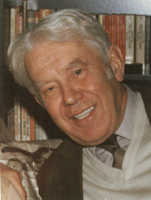
EDT c. 1980
Eric Donovan TAGG (b. Wedneday, 8 October 1913 - d. Thursday, 23 July 1988) was my dad and, of course, father to my two brothers Roger and Stephen, as well as grandad to my daughter Mia and to my nephews Sam, Nathan and Michael. If he’d been alive today (Tueday, 8 October 2013) we’d be celebrating his 100th birthday. I’m celebrating it here on line anyhow, not so much because I still sometimes miss him as because he was a basically good man whose life has interest not just for me and for the rest of his immediate family but also, I think, for anyone wanting to understand how personal experience and working life link with much broader social, cultural and political issues. After all, his life spanned most of human history’s most violent and destructive century. As he himself once quipped, ‘I was born just before World War I and got married just before World War II; so I dread to think what’ll happen when I die!’.
Early years
Donovan was born in a Methodist manse on the north side of a steep road leading up towards the moors out of Lower Darwen, one of the ‘4,000 holes’ near Blackburn (Lancashire).[1] His father, Joseph Tagg, was a blacksmith’s son from The Fens who became a Methodist minister.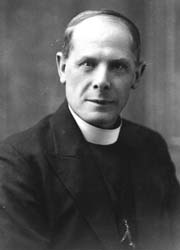 Joseph Tagg (1930?) |
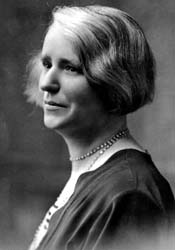 Ada Tagg, née Marshall (1930?) |
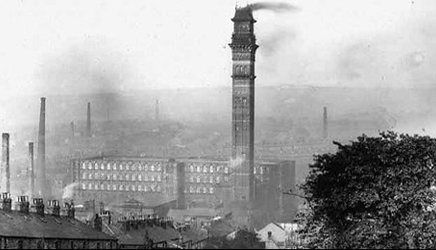 India Mill, Darwen |
|
Most of Donovan’s childhood was spent in damp manses in industrial East Lancashire (Darwen, Oldham, Rochdale, etc.). As a young boy, he suffered from something that may have been rickets, or at least some sort of condition caused by dietary and environmental deficiencies that were not uncommon in those days —wartime deprivation in cold, wet, coal-smoke-polluted industrial towns. At this time he received a lot of attention from his mother Ada (née Marshall), a highly intelligent, quick-witted, well-educated, well-read and, according to several accounts, good-looking woman.This contact with her during his most formative years must have contributed substantially to Donovan’s outstanding school results and to his gaining a scholarship to Manchester Grammar School.
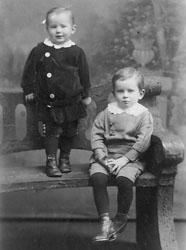 Donovan (left) with his brother Douglas (c, 1915) |
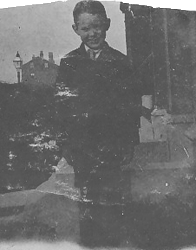 Donovan in a ‘Blackburn hole’ [2] (c. 1920). amid rubble and gas lamp |
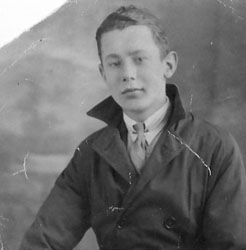 Donvan at Manchester Grammar School (c. 1928) |
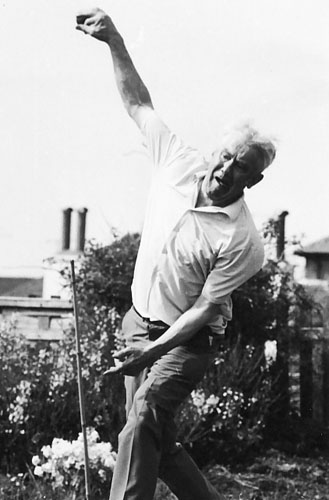 Donovan delivers a googly in Heysham (c. 1978) |
Donovan’s early years were, I think, absolutely essential to the formation of his world view and to his personal survival strategies in at least three ways.
[1] As a once sick child he learned to treasure good health and involved himself in many sporting and other outdoor activities throughout life. He played rugby and golf but was most skilled at cricket, especially as a leg-spin bowler with googlies as a speciality. He played for Chorley in the Lancashire league (1930s), in the minor counties league for Cambridgeshire (1947-8), and for our local town team (Oundle, 1949-63).
[2] With socio-economic deprivation all around him and New-Testament-based, non-conformist Christianity both at home and in chapel, he became strongly committed to causes of social justice, idealism and self-betterment. He was a local (lay) preacher in the Methodist church for over fifty years and a committed pacifist (an ethical belief which severely affected his career). He was also a committe member of the local Alcoholics Anonymous chapter even though he’d hardly ever touched a drop of the stuff and, as tutor and dean, he took his pastoral duties very seriously. When he finally got a proper lecturing job, not a single Christmas dinner went by without the presence at our table of at least one foreign student who couldn’t afford the fare back home over the short holiday.
[3] Thanks to his talent and diligence, Donovan’s studies spared him from having to directly confront the misery of industrial labour, degrading unemployment and abject poverty affecting his father’s Methodist circuits in areas that relied heavily on mining and manufacturing for economic survival. In this way he came to see knowledge and education as strategies liberating the individual from drudgery and deprivation. It’s worth remembering here that between 1918 and 1921 UK economic output fell by 25% and did not recover until the late 1930s. Moreover, UK miner’s pay almost halved between 1920 and 1926, thus provoking the General Strike. These were miserable times for ordinary working people. Dad voted consistenly Labour from 1934 until he died; and he had no kind words for the blacklegs who helped scupper the General Strike, even though he’d always wanted to drive a train!
These aspects of Donovan’s early years sometimes resurfaced later in his life as a quite visceral sort of time warp. For example, he hated the smell of ale because it reminded him of men in his Dad’s ministry who, fifty years earlier, saw no other way of getting through the day than by drowning their misery in buckets of beer. Nor (in the 1970s) could he stand the sound of my newly purchased orthopedic Vollsjö clogs on the pavement outside the house because it sounded like ‘the clatter of clogs on cobbles in a Lancashire mill town’.[3] Those weren’t good memories for him. He’d worked hard to‘get out of that place’ and did not want to be transported back there by sounds or smells.
“Pure” mathematics, Princeton and Oundle
![]() Another curious part of the legacy from Donovan’s early years seems to me to lie in what I found to be a purist stance on pure mathematics, the field in which he excelled academically. Though never as extreme as the professor in the cartoon above, he sometimes expressed an aesthetic, poetical view of pure maths, of its ‘uselessness’ in terms of beauty and of its self-containment as a perfect system of thought. I tried hard to understand why he didn’t see his subject as theoretical (abstract) experimentation, speculation and generalisation that might subsequently be applied to external reality or that could even take inspiration from external reality in the creation of its models.
Another curious part of the legacy from Donovan’s early years seems to me to lie in what I found to be a purist stance on pure mathematics, the field in which he excelled academically. Though never as extreme as the professor in the cartoon above, he sometimes expressed an aesthetic, poetical view of pure maths, of its ‘uselessness’ in terms of beauty and of its self-containment as a perfect system of thought. I tried hard to understand why he didn’t see his subject as theoretical (abstract) experimentation, speculation and generalisation that might subsequently be applied to external reality or that could even take inspiration from external reality in the creation of its models.
When I bought him the book Mathématique et affectivité (1976) I had hoped it would open a dialogue that might help me understand his world of maths, but he never read the book: he seemed to be offended by the very notion of linking pure maths with anything else. I tried again some years later by asking him about models that might help me deal with multi-dimensional factors in connection with my PhD. He stopped that conversation before it had a chance to start. I had to accept that I would never gain access to a world of thought that meant so much to him.
I think his vision of pure maths as an epistemic safe house held existential value for him. It was as if it transcended not only the ugly world from which his studies had saved him but also most other modes of reasoning that were dogged by the drudgery of empirical verification. It was, so to speak, his mental sanctuary. None of which means, I hasten to add, that his day-to-day use of maths in education was dominated by anything resembling such purism. For example, he introduced optional courses in Statistics during his time at Oundle School (see also later on ).
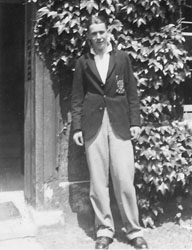 Clare College, Cambridge (1933?) |
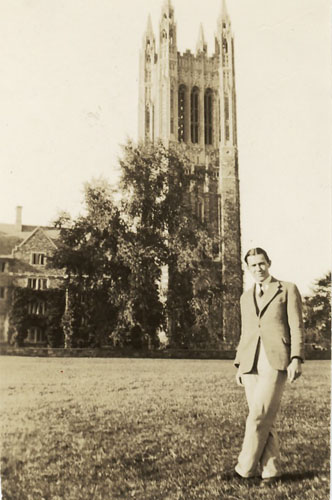 In front of Princeton University tower (1937?) |
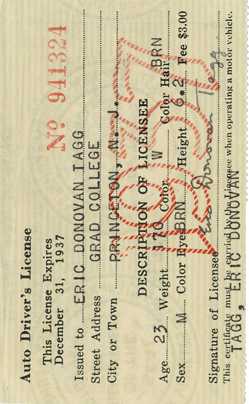 New Jersey Driving License |
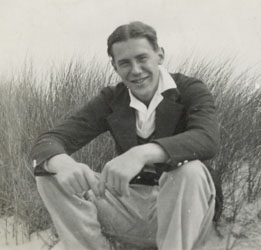 At Shell Bay, Dorset (1938?) |
Donovan was only 18 when he won a scholarship to read maths at Clare College, Cambridge. After graduating he was awarded a Commonwealth Fund Fellowship (now Harkness Fellowship) to study at Princeton (1936-7) where his chief advisor was John von Neumann. After Donovan’s death in 1988 we discovered notes he’d taken at lectures given at Princeton by Von Neumann and Einstein. Then, after his return to Cambridge in 1937, he completed his PhD dissertation under the supervision of Henry Frederick Baker. Its title is quite a mouthful: The Reduction of Singularities for Curves over any Base Field of Characteristic Zero and some Applications to Classical Algebraic Geometry.
During his time in the USA he and his friend, colleague and cricketing team mate, Raymond Lyttleton, bought a second-hand car and drove across the continent. It seems to have been a particularly happy time in his life. It was also the time of The New Deal and Dad was able to see first hand how the ‘3 Rs’ —Relief for the poor and unemployed, economic Recovery and Reform of the financial system— offered hope to the popular majority. It was so much better than what he knew from the UK. One snag with his enthusiam for New Deal policies was that he was initially reluctant to accept the truth about Watergate, but that soon passed. Even if he could be quite obstinate, this definitely wasn’t the only time he revised his opinion when presented with new evidence.
In the autumn of 1937 Donovan became full-time maths teacher at Oundle School.[4] It was around then that both his parents died. In August 1939 he married my mother, ‘Mike’ Tagg (née Elliott). Two weeks later the UK declared war on Nazi Germany.
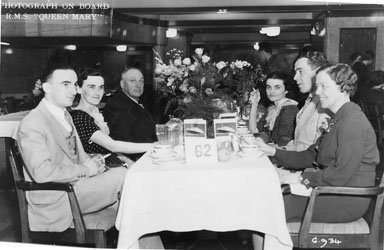
Raymond Lyttleton (left, front) and Donovan Tagg
(right, middle)
crossing the Atlantic on the Queen Mary (1937?)
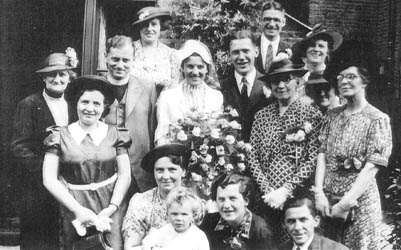
‘Mike’ and Donovan’s wedding, August 1939. Donovan’s sister ‘Pan’
is in the middle of the front row.
Click here for picture of Donovan Tagg with Fire Brigade 2 at Peterborough United Football Ground in 1940
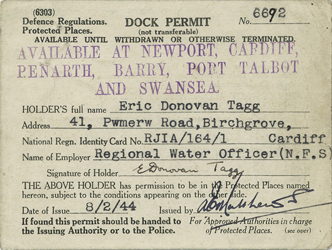
![]() Called up to fight in World War II, Donovan, a 26-year-old pacifist, had to face a Conscientious Objection Tribunal and convince its members that he should be allowed to serve as a civil non-combattant. I never heard the details of this process but Dad gave me the impression that it was no barrel of laughs. He trained as a firefighter in nearby Peterborough and was then sent to put out fires in the frequently blitzed Cardiff docks. Travel between Cardiff (South Wales) and his home in Oundle (East Northamptonshire) is not an easy undertaking at the best of times. During the war without your own wheels and without money for public transport that was anyhow infrequent or disrupted, he had to hitch lifts across the country, usually under blackout, just to be with his wife when he was granted leave. Both my brother Roger and I must have been conceived at weekends under circumstances of considerable stress. With Donovan in Cardiff, with the responsibility for evacuees from the London blitz, then her own infant son in the home, then a second (me), mother found it increasingly difficult to cope. All this strain caused a psycho-somatic disorder that affected her for the rest of her life. Donovan tried to make up for his forced absence once the war was over by giving my brother and me extra attention but mother never really recovered from what had happened. These domestic effects of the war saddened Donovan deeply and were not improved by what happened next.
Called up to fight in World War II, Donovan, a 26-year-old pacifist, had to face a Conscientious Objection Tribunal and convince its members that he should be allowed to serve as a civil non-combattant. I never heard the details of this process but Dad gave me the impression that it was no barrel of laughs. He trained as a firefighter in nearby Peterborough and was then sent to put out fires in the frequently blitzed Cardiff docks. Travel between Cardiff (South Wales) and his home in Oundle (East Northamptonshire) is not an easy undertaking at the best of times. During the war without your own wheels and without money for public transport that was anyhow infrequent or disrupted, he had to hitch lifts across the country, usually under blackout, just to be with his wife when he was granted leave. Both my brother Roger and I must have been conceived at weekends under circumstances of considerable stress. With Donovan in Cardiff, with the responsibility for evacuees from the London blitz, then her own infant son in the home, then a second (me), mother found it increasingly difficult to cope. All this strain caused a psycho-somatic disorder that affected her for the rest of her life. Donovan tried to make up for his forced absence once the war was over by giving my brother and me extra attention but mother never really recovered from what had happened. These domestic effects of the war saddened Donovan deeply and were not improved by what happened next.
After the war Donovan went back to teaching at Oundle where he also acted for a few years as Division Superintendent in the volunteer St John’s Ambulance service. During the 1950s he applied several times for jobs commensurate with his expertise and academic qualifications but his war record —or his alleged lack of it— was a definite career disadvantage in those days. Moreover, since his financial situation as conscientious objector was more precarious than that of those who had served in the military, and since he wanted his sons to attend ‘good schools’ that cost ‘good money’, he felt compelled to take on a housemaster’s job that provided free accommodation but which involved a lot of chores that he did not relish (1948-1963). His frustration during this period was palpable and would from time to time erupt in short fits of really bad temper.
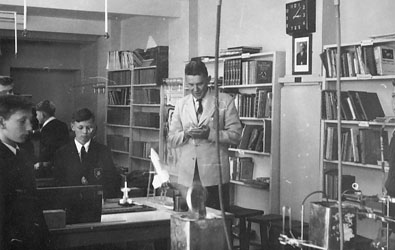
Right:Donovan marking
a physics exam
at Oundle School in the 1950s
Nevertheless, he was able to involve himself in a range of important maths-related projects. Metrication was one of them. In the mid fifties[5] he calculated that several years of maths teaching were wasted on learning to convert ounces into pounds (×16) into stone (×14), pounds into shillings (÷20) into pence (÷12), inches into feet (×12) into yards (×3) into chains (×22) or miles (×1,760), etc. And as for Fahrenheit with neither 0° nor 100° but 32°, 98.4° and 212° having any significance, forget it!
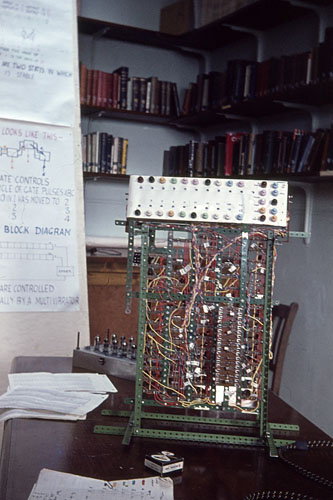
OSTEC, the Oundle School Teaching
and Education Computer (1963)
Around 1960 Donovan introduced computing into his teaching at Oundle School. He managed to acquire transistors from Texas Instruments and, using Meccano, succeeded in getting pupils to construct OSTEC, the home-made digital device shown here on the right (1963). It could carry out standard arithmetical operations quite efficiently. It was also in 1963 that he left behind his duties as housemaster and seemed to become a happier man. That same year he became the first Chair of the British Computer Society’s (BCS) Schools Committee.
From the mid 1960s onwards Donovan was closely associated with IFIP (Internation Federation for Information Procesing). He was particularly active in working groups focusing on computers in education (‘TC3’, ‘WG3.1’, ‘WG3.2’). As a pensioner he put in long hours editing contributions to the proceedings of the European Conference on Computers in Education (ECCE). The 1988 ECCE proceedings were dedicated to his memory.
Around 1984 Donovan finally bought a computer for himself. It was a Commodore PET. He started writing his memoirs on it but didn’t get very far. He seemed to prefer green-on-black jumbo jet landing simulations and thinking about the algorithms that provided him with such fun.
![]() In the early sixties, Donovan was invited by colleagues from his Princeton days to lecture in the USA. He applied for a visa and was summoned to the US embassy in Mayfair for a McCarthyist grilling because he was a known pacifist and ex-member of the Peterborough branch of the UK-Soviet Friendship Association. He was refused a visa at least once but finally managed to visit Virginia and Texas in 1966. The taxi driver taking him down town from Dallas airport blabbed on so disparagingly about ‘niggers’ that Donovan got out of the cab on the freeway and refused to pay. He ordered another cab for the rest of his journey from a nearby out-of-town shopping mall.[6]
In the early sixties, Donovan was invited by colleagues from his Princeton days to lecture in the USA. He applied for a visa and was summoned to the US embassy in Mayfair for a McCarthyist grilling because he was a known pacifist and ex-member of the Peterborough branch of the UK-Soviet Friendship Association. He was refused a visa at least once but finally managed to visit Virginia and Texas in 1966. The taxi driver taking him down town from Dallas airport blabbed on so disparagingly about ‘niggers’ that Donovan got out of the cab on the freeway and refused to pay. He ordered another cab for the rest of his journey from a nearby out-of-town shopping mall.[6]
It was also in the 1960s that Donovan developed his Datella, an ingenious little device consisting of three thin, white cardboard discs (or hexagons) of different diameter and joined at the centre by a simple brass fastener. By turning the year, month and day-of-the-month discs to align with a particular date you could simply read off its day of the week. No battery and no electricity needed. It was the ecological analogue version of the system date on digital devices or of online applets like this one. There was even talk of turning Datella into a commercial product but nothing came of it.
Donovan had many interests. He was a keen gardiner, grew many of our own vegetables in the 1950s and, starting in the 1960s, cultivated his flowers with care and pride. Seed catalogues seemed to be his preferred bathroom reading matter. He was also one of the few people who took recycling seriously back in the 1960s. He stuck up for an ecologically pioneering colleague who was ridiculed by many at the time[7] and he rightly read the riot act at an old friend who claimed that throw-away aluminium cans were ‘the future’. We never saw that friend again.[8] Donovan was a keen hill-walker, too, another probable legacy from his early years when fresh air and wide, untouched open spaces were at a premium.
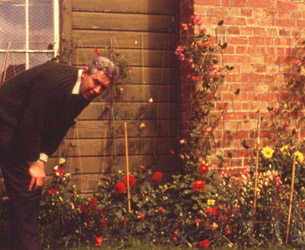
With his
flowers at 10 Milton Road, Oundle (c. 1965)
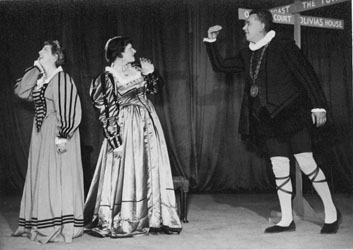
As
Malvolio
in an
Oundle School staff
production
of
Shakespeare’s 12th Night
(1966)
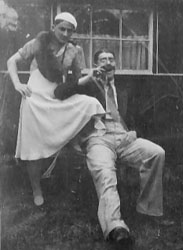
Raymond Lyttleton as ‘a dame’ and Donovan as Groucho Marx after their return from the USA
Donovan enjoyed all sorts of cultural activity. He played Malvolio with great gusto in a staff production of Twelfth Night, and often quoted literature he may well have first heard from his mother. He always beat us at Scrabble, was a crossword addict and enjoyed a good crime story. In fact the last writing he did was in The Guardian crossword the day he died and the last words he uttered were ‘Silly people! Don’t they know he’s got 'em now?’ while watching an episode of Columbo.[9] Most remarkable from my viewpoint were, on the cultural front, his musical skills, especially his idiosyncratic, self-taught piano technique characterised by a consistent 80-millisecond delay between his left and right hands hitting the keys —the ‘k-ching’ or ‘b-dong’ effect à la Charlie Kunz or Carroll Gibbons, even when playing the minuet from Mozart’s 39th symphony, as arranged in Easy Classics for the Piano. The main thing was that he derived great pleasure from making music even when, in his forties, he took it upon himself to learn the cello. He was fond of music, listened regularly to the BBC’s euroclassical Concert Hour, was a fan of Bach, found Handel a bit pompous, and could occasionally be heard ‘doodle-dooing’ swing tunes or big-band riffs.[10] And he wasn’t without a sense of humour: he adored the Marx Brothers, especially Groucho, and laughed heartily when, in 1962, I took him to see the ’Running Jumping & Standing Still Film’ (The Goons and Richard Lester, 1960).
Lancaster
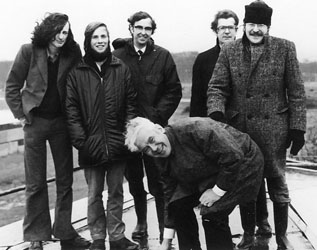
Topping out ceremony, Pendle College, 1972
(Donovan bending with trowel, Marcus Merriman far right)
In 1967 Donovan finally got the sort of job he should have had twenty years earlier. He was taken on by Lancaster University to run its Accelerated Mathematics Project, aimed at improving the maths skills of non-maths students —hardly a pure maths undertaking!
![]() Donovan worked at Lancaster until his retirement in 1978. He was twice Head of the Maths Department and was appointed first Principal of Pendle College in 1975. He became a much happier man in/at Lancaster. He seemed relieved and grateful to be in a working environment that appreciated his skills and that was sympathetic to his views. It was as if he’d come home, not so much in the sense of back to Lancashire (though that may have been significant, too) as because he felt he was valued by the colleagues and students he worked with. The full extent of that appreciation was unknown to me until a few days ago when, checking dates for this piece, I heard for the first time about something called The Donovan Tagg Award. Its official description runs as follows:
Donovan worked at Lancaster until his retirement in 1978. He was twice Head of the Maths Department and was appointed first Principal of Pendle College in 1975. He became a much happier man in/at Lancaster. He seemed relieved and grateful to be in a working environment that appreciated his skills and that was sympathetic to his views. It was as if he’d come home, not so much in the sense of back to Lancashire (though that may have been significant, too) as because he felt he was valued by the colleagues and students he worked with. The full extent of that appreciation was unknown to me until a few days ago when, checking dates for this piece, I heard for the first time about something called The Donovan Tagg Award. Its official description runs as follows:
‘From its inception in 1972 until his retirement in 1978, Pendle was blessed with one of the nicest Principals at Lancaster, Dr. E.D. Tagg of the Mathematics Department who died in July 1988. Both he and his wife Mike gave countless hours of attention and care to numerous Pendle students and to the College’s many vexatious cares during those early years. When he stood down as Principal, the J.C.R. proposed that a prize be established in his name, to be awarded annually to people who make significant contribution to the life and spirit of the college. Any member is eligible and may be nominated (likewise) by any member.’[11]
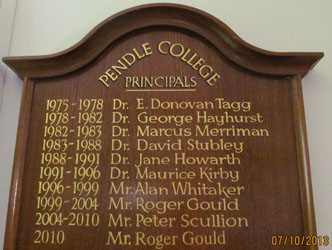
List of Principals, Pendle College (2013)
I was similarly bowled over by the huge turnout at his funeral in Greaves Methodist church on Scotforth Road in Lancaster (1988). I heard sincere eulogies from representatives for Alcoholics Anonymous and other charitable bodies, as well as from students, colleagues and ecumenically minded members of several Christian denominations. Such eulogies were difficult to square with the anxious and frustrated dad I knew from my formative years (1948-1963, see above) but not with the exemplary grandad he was to my daughter. For me, the realisation of the man’s true character in the eyes of others was not so much a matter of redemption as of understanding how external (socio-political) forces had, in conjunction with inevitable personal survival strategies, prevented Donovan from realising his full humanist potential before we had flown the coop and before he’d had the opportunity to ‘get back home’, as he did in the last twenty years of his life. We ended up by having a lot of respect and affection for each other. Three examples:
[1] As a ‘fervent atheist’, I never heard him utter any intolerably metaphysical mumbo-jumbo in any of his sermons. That’s why, when he’d completed fifty years as a local preacher in the Methodist Church in 1984 or 1985, I sent him a congatulations telegram from Sweden. It’s also why I offered to play organ or harmonium for him a few times when he drove off to remote chapels to hold Sunday service.
[2] Despite being a convinced Christian, he held a basically socialist view of the world and sympathised with my frustrations with the ‘loony left’. When I became a communist party member in 1972 he said ‘That’s always struck me as a bit like signing up as a local preacher’. Spot on! Unfortunately I shall never know how he knew about the dangers of ritualism and reification in left-wing politics.
[3] In 1982, knowing my strong political views, he asked me how on earth he and mother could be the only ones on their street to oppose the Falklands War. How many new hospitals could have been built, equipped and staffed? How many student scholarships could have been financed, how many lives saved? Why weren’t people asking those questions? Why were they so jingoistic? Why did they want to destroy the welfare state that had helped people out of the injustices that he’d seen in his formative years? Didn’t they know about the misery of bygone years or had they chosen to forget? Of course, I didn’t have any satisfactory explanations but the discussion that ensued about subjectivity, advertising, religion and politics was fruitful, instructive and gratifying. We’d finally had a real conversation!
I’m leaving the last words about Donovan to my daughter. Dismayed by news of her grandad’s death, she asked me tearfully ‘What can I do?’ I thought for a short while and suggested: ´Why not write a little letter to Grandma. Say how sad you are, and tell her what you remember best about him.’
Here’s what she wrote
‘Dear Grandma,
I am so sad that Grandad has died. He would take my hand and rush up to the top of the hill and tell me the names of all the places you could see’....
That’s the man I’m celebrating here on the hundredth anniversary of his birth. Today I’m the same age as he is in the photo thirty years ago...
Philip Tagg, Huddersfield 7-11 October, 2013
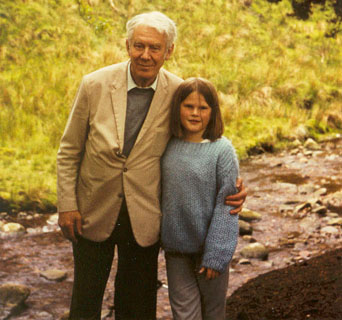
![]() Donovan with grand-daughter, Mia,
Donovan with grand-daughter, Mia,
Trough of Bowland, summer 1983.
Endnotes
1. ![]() I read the news today, oh boy! Four thousand holes in Blackburn, Lancashire. And though the holes were rather small, they had to count them all. Now they know how many holes it takes to fill the Albert Hall’ from ‘A Day In The Life’ by John Lennon on The Beatles’ famous album Sergeant Pepper’s Lonely Hearts Club Band (1967).
I read the news today, oh boy! Four thousand holes in Blackburn, Lancashire. And though the holes were rather small, they had to count them all. Now they know how many holes it takes to fill the Albert Hall’ from ‘A Day In The Life’ by John Lennon on The Beatles’ famous album Sergeant Pepper’s Lonely Hearts Club Band (1967).
3. ![]() ‘The clatter of clogs in the Lancashire mill towns, the to-and-fro of the lorries on the Great North Road, the queues outside the Labour Exchanges, the rattle of pin-tables in the Soho pubs, the old maids hiking to Holy Communion through the mists of the autumn morning – all these are not only fragments, but characteristic fragments, of the English scene. How can one make a pattern out of this muddle?.’ George Orwell: England Your England (1953), section I.
‘The clatter of clogs in the Lancashire mill towns, the to-and-fro of the lorries on the Great North Road, the queues outside the Labour Exchanges, the rattle of pin-tables in the Soho pubs, the old maids hiking to Holy Communion through the mists of the autumn morning – all these are not only fragments, but characteristic fragments, of the English scene. How can one make a pattern out of this muddle?.’ George Orwell: England Your England (1953), section I.
4.![]() Oundle is a small town in East Northamptonshire. It had a population of 3,000 in the 1950s (now 6,000). Oundle School is one of the UK’s major ‘public’ (= private) schools. Its enlightened tradition of learning is vividly described in this article by Old-Oundelian Richard Dawkins.
Oundle is a small town in East Northamptonshire. It had a population of 3,000 in the 1950s (now 6,000). Oundle School is one of the UK’s major ‘public’ (= private) schools. Its enlightened tradition of learning is vividly described in this article by Old-Oundelian Richard Dawkins.
5. ![]() My brother Roger estimates that Donovan’s interest in metrication dates from the time of the Suez Crisis.
My brother Roger estimates that Donovan’s interest in metrication dates from the time of the Suez Crisis.
6. ![]() This is how I recall Donovan’s oral account of those events in Dallas.
This is how I recall Donovan’s oral account of those events in Dallas.
7. ![]() Old-Oundelian Richard Dawkins (author of The Selfish Gene and The God Delusion) just informed me in an email (2013-10-10) that the name of the pioneering ecologist was William Cartwright, German teacher at Oundle School. Dawkins wrote: ‘You'll find a reminiscence about him in two of my books. The Ancestor's Tale... and my own autobiography just published, An Appetite for Wonder, which has a whole chapter on my time at Oundle, and a whole paragraph on Boggy Cartwright.' I had assumed that Mr Cartwright, was nicknamed ‘Boggy’ because he insisted on the importance of compost. My brother Roger tells me it’s simply because his initials were ‘WC’.
Old-Oundelian Richard Dawkins (author of The Selfish Gene and The God Delusion) just informed me in an email (2013-10-10) that the name of the pioneering ecologist was William Cartwright, German teacher at Oundle School. Dawkins wrote: ‘You'll find a reminiscence about him in two of my books. The Ancestor's Tale... and my own autobiography just published, An Appetite for Wonder, which has a whole chapter on my time at Oundle, and a whole paragraph on Boggy Cartwright.' I had assumed that Mr Cartwright, was nicknamed ‘Boggy’ because he insisted on the importance of compost. My brother Roger tells me it’s simply because his initials were ‘WC’.
8. ![]() Eric Conradi was best man at Donovan’s wedding. He later held an executive position in The Metal Box Company.
Eric Conradi was best man at Donovan’s wedding. He later held an executive position in The Metal Box Company.
9. ![]() According to my mother’s older sister, my Aunt Margaret (1908-2005), who was helping Donovan out while mother ‘Mike’ was in hospital, Donovan had finished supper and sat down to do the Guardian crossword and watch Columbo (multi-tasking). The next thing she heard from him after the comments about Columbo was a short cry of pain. She rushed in from the kitchen and found him slumped over the newspaper as the Columbo credits rolled up the screen. He’d died of a heart attack before Columbo had finished and with two clues left in the crossword.
According to my mother’s older sister, my Aunt Margaret (1908-2005), who was helping Donovan out while mother ‘Mike’ was in hospital, Donovan had finished supper and sat down to do the Guardian crossword and watch Columbo (multi-tasking). The next thing she heard from him after the comments about Columbo was a short cry of pain. She rushed in from the kitchen and found him slumped over the newspaper as the Columbo credits rolled up the screen. He’d died of a heart attack before Columbo had finished and with two clues left in the crossword.
Margaret Elliott, my aunt, is another person who deserves a place in cyberspace. She decided, around 1923, to dedicate herself to a career in nursing, lied about her age, went (under age) to nursing college, never married, wrote poetry, learned to drive, tolerated no dishonesty, was generous, interesting, friendly and devoted to her work. She was pretty and the opposite of a bitter spinster! She retired from her final full-time position as Matron of Wanstead Hospital (East London/metropolitan Essex) some time around 1970 but went on to run nursing homes in the Leicester and Bournemouth areas. She died in 2005.
10. ![]() Among the bands he mentioned were those of Jack Hylton, Ray Noble and Glenn Miller.
Among the bands he mentioned were those of Jack Hylton, Ray Noble and Glenn Miller.
11. ![]() Text sent in email by Jill Harpley, Pendle College Administrator, 2013-10-07. ‘JCR’ = Junior Common Room, i.e. the undergraduate population of the college.
Text sent in email by Jill Harpley, Pendle College Administrator, 2013-10-07. ‘JCR’ = Junior Common Room, i.e. the undergraduate population of the college.
Acknowledgements:
Thanks to my brother Roger Tagg (Adelaide) for several items of information included in this piece, to Bob Lewis and Frank Lovis for the short obituary they wrote for the IFIP journal in 1988, to Jill Harpley (Lancaster) for information about Donovan at Pendle College, and to Richard Dawkins for information about Mr Cartwright.